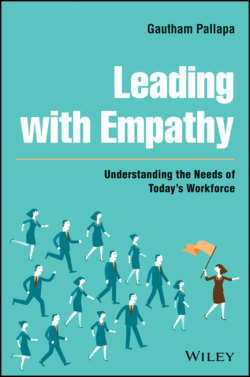Читать книгу Leading with Empathy - Gautham Pallapa - Страница 11
Apocalypse Bingo
ОглавлениеFirst the pandemic, which divided us, economically devastated us; it has killed nearly 4.1 million15 of us worldwide.16 Then the racial unrest, erupting at the deaths of more Black Americans at the hands of police: George Floyd, Breonna Taylor, Rayshard Brooks, Daniel Prude—to name a few.
Combine that with extreme weather patterns. For only the second time in history, the National Hurricane Center moved into the Greek alphabet for storm names. The wildfires of 2020 were bigger, deadlier, and more frequent than in years past. For months in several West Coast cities of the United States, people could not breathe properly.17 Many were evacuated, lost their homes, and there was widespread destruction. On a personal front, we almost got evacuated ourselves and experienced a level of anxiety and stress that we had never faced before. We also caught a glimpse of an inevitable bleak dystopian future with red skies, an ash-covered moon, and a blotted sun for days.
In record numbers, humans have been anxious, worried, sleep-deprived, distracted, and depressed. The COVID-19 pandemic's triple whammy of an invisible and omnipresent threat (coronavirus infection), profound disruptions in daily life, and uncertainty for the future thrust many people into a chronic, high-stress state that is, let's just say, less than optimal for rational thinking or any other sort of higher-order cognitive functioning.
Many social forums and social circles started referring to all this adversity as 2020 bingo or Apocalypse bingo. They made it a game of checking off items from a master list of apocalyptic scenarios: Australian wildfires, a plague of locusts and cicadas, war in the Middle East, an asteroid larger than the Empire State Building passing by Earth, solar flares, and increased seismic activity in Yellowstone suggesting reactivation of the supervolcano are but a few examples on the apocalypse bingo card. Several memes emerged as part of this macabre humor.18
While the COVID-19 pandemic raged on worldwide, the immediate mental health impact of this collective trauma is coming into focus even as the outlook for long-term psychological effects remains considerably fuzzier.
Are we experiencing a pandemic of mental illness? Much has been reported about the ill-termed “mental health pandemic” that seems to be surging through the United States and other countries in lockstep with lockdowns and the death, societal disruption, and economic devastation of the viral pandemic. Many experts have sounded the alarm for an approaching tsunami of psychological maladies that could sink an already overburdened mental healthcare system.
A growing cache of data seem to bear out those fears. A recent population survey conducted in April and May found a threefold increase in depression since the pandemic began.19 The researchers examined mental health problems relative to 13 pandemic-specific stressors, including loss of a job, death of someone close to you due to COVID-19, and financial problems. The more stressors people reported, the more likely they were to also report symptoms of anxiety and depression. Other studies show similar rises. From April to October of 2020, the National Center for Health Statistics partnered with the Census Bureau and tracked anxiety and depression symptoms among Americans in household pulse surveys, finding a sharp rise in both.20
